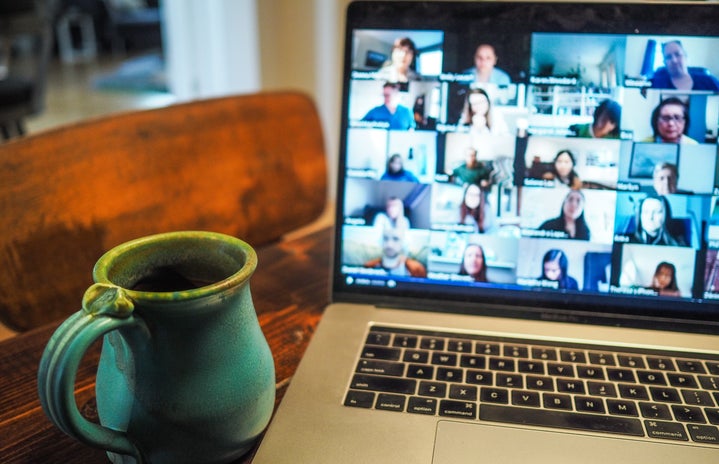The coronavirus pandemic has limited human-to-human in-person interaction. The sole connection for most people is to communicate with others online. Work meetings, classes for school, and even virtual happy hours are all part of day to day life now. With new online forums like Zoom, virtual interactions can become debilitating. This can result in Zoom anxiety.
Zoom anxiety is a feeling of stress and fear when on a Zoom call. It can be characterized as having trouble unmuting and participating in discussions, having a crippling fear of contributing in class, trouble reading social cues or body language online, fear of unsolvable tech problems such as wifi connection, and uncertainty about the professionalism of your space, including background or appearance. Zoom can leave room for awkward silences, people talking over one another and misunderstandings about who speaks next, all this contributes to the anxiety. Oftentimes Zoom fatigue; weariness after a Zoom call, gets the limelight, but Zoom anxiety is just as important to recognize and acknowledge.
Zoom Anxiety can be draining and it is one of the many adversities that Zoom has caused for online students. American University senior journalism student Hunter Rich feels that his anxiousness does not stem so much from Zoom itself, but rather from the feelings of disconnectedness and falling behind.

The American University Counseling Center does offer advice and resources to students dealing with anxiety with the COVID-19 pandemic like online counseling services for students with clinicians. This allows students to have the opportunity to talk about anxious feelings surrounding the global pandemic and Zoom calls. This can be contradictory as it is also in a virtual setting, but, having your camera off can help with expressing your feelings in a safe environment.
University of Pittsburgh freshman Tate Mueller says she is much more likely to participate in-person discussions rather than online. “You just don’t know when someone is going to unmute themselves or going to talk next and then you end up talking over someone.” Mueller said.
Zoom Anxiety not only affects participation but can impede on students engagement with class material. “I feel a lot less engaged and it’s a lot harder to stay focused.” Mueller said. There are ways that professors can keep students engaged, by allowing for open discussion in the chat box and reading answers aloud, having group discussions in smaller breakout rooms for a more intimate setting, and holding virtual office hours for students to talk one on one. Even then the virtual setting impedes some students from even trying to cultivate those relationships with professors because of the online forum.
“Part of the reason I came to AU was for the amazing faculty and being able to do things, like get coffee with them,” Rich said. “Now we just can’t do that.”
There is no easy remedy to Zoom anxiety just like all versions of anxiety. It is a daily struggle but there are ways to help counter it. First, ask your professors for breaks. If you are starting to feel disengaged or anxious, allow yourself to walk away for a moment and regroup.

Lastly, use the chat box! The chat box is your friend! If you have something you’d like to say type it there. That way you are still engaged with the conversation but don’t have to unmute yourself or put yourself in an uncomfortable situation.
Overall, Zoom anxiety is a topic that is not as openly spoken about and should be. People struggle with anxiety and virtual forums like Zoom can create an isolationist feeling. As a society, we need to have a deeper conversation about what the pandemic has done to our social interactions and be compassionate towards one another.



